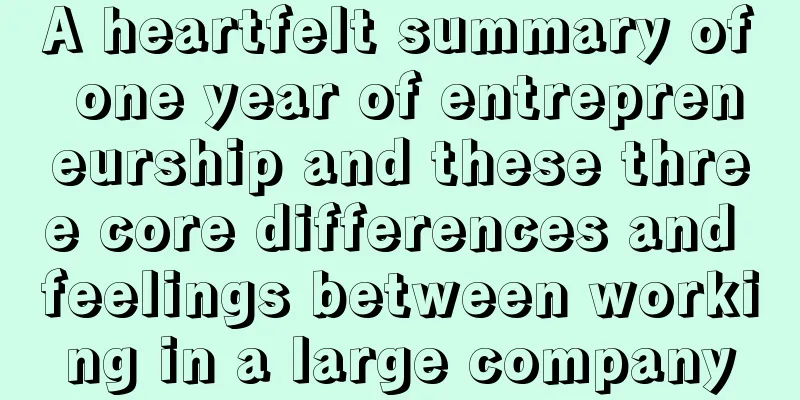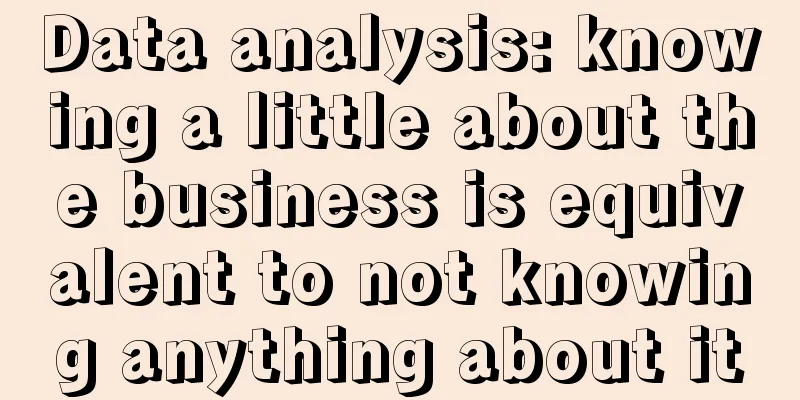A heartfelt summary of one year of entrepreneurship and these three core differences and feelings between working in a large company

Friends always ask: Is it fun to start a business? How is it different from working? The questioners are usually my friends who work in big companies. You can tell from their eyes that they want to escape but are also afraid. There are also many unfamiliar fans who leave messages to encourage me. Because my present is what their present will be 5 or 10 years from now. To put it nicely, I am a pioneer in the workplace; to put it bluntly, I am old and need to explore the way and step into the pitfalls for others. I have been running a business for a year now, so I would like to give you an assignment. I would like to talk about the difference between starting a business and working. 1. The greatest reward of entrepreneurship is spiritual freedomEntrepreneurship brings more freedom, including physical freedom and spiritual freedom. Physical freedom means that you can do what you want to do or what you think is meaningful. When I started a business, I always spent a lot of time thinking and often asked others for advice. As long as I felt that the direction of this thing was reliable, I would start to act immediately. From thinking to doing, there is not much friction. This is physical freedom. Invest time in what you want to do, even if the progress is not obvious, there is no regret. It feels really good to be in control of your own time. It's completely different at work. Most of what we do is something we have to do, and individuals have no ability to resist. One of the core demands of the company for employees is collaboration. We hope that the team can get results through collaboration, rather than pure personal heroism. Even if I had been a mid-level or senior manager before, it would be useless. There are many meetings that I have to go to. There are even some meetings where my participation is only meaningful because the person in charge of the collaboration party is also present. These physical constraints are minor matters, but what is more painful is the lack of spiritual freedom. In the workplace, people are judged by the company. First of all, every employee of a large company has a character on his head, representing his level, such as P7, 2-2, K3C. When you meet someone with a higher number than you, you will always feel inferior to them. Over time, we will also pursue the improvement of this number by giving a PPT presentation to 4-5 people, even if these people do not understand your business and may not be better than you. Secondly, the company will tell you whether you have done well or just so-so at the end of the year, using letters such as A, B, and C to express it. These are all the company's judgments on people. This judgment process is often carried out by one person on behalf of the company, that is, your superior. Regardless of whether your superior's ability, personality, knowledge, IQ, EQ, and communication skills are better than yours, he has the right to judge you. There is no absolute fairness. If you want to get a good judgment, you need to do things according to your superior's wishes, even if it means doing something disgusting. Some people feel frustrated at work, and this is the reason: they are not spiritually free. 2. Leaving the platform, starting a business made me a small individualWhen I was working in a big company, we were in charge of some traffic and budget, and we were also external interfaces, so many people treated us like masters. I know that this is just because people are in this position. Don't regard platform resources as your own ability. Although I have this psychological expectation, I work with a zero mentality every day after starting a business, but I still feel that there are many challenges. First of all, there is a very detailed division of labor in large companies. Each role is only responsible for his own part, and other work will naturally be taken care of by others. As the person in charge of a business, I also make decisions according to the rules of the game and hold my own baton. After starting my own business, I found that I had to hold many batons in my hands, and I had to run each baton myself, or accompany someone to run the whole way. I am not afraid of hard work, but there are several batons, and I really don’t know how to run them, and I don’t have the skills. For example, I learned how to live broadcast and shoot short videos, which I didn’t know before. Some friends may ask, you used to be on the short video platform, why don’t you know how to play these? It is true, and I am not the only one. I once talked with a former colleague who was at a higher level than me. He also felt like an idiot after starting his own business. We both joked that with our level, we used to hold meetings to give lectures to our partners. They were much more professional than us, and they were just giving us face. I posted this view on social networking sites, and many friends responded to express their agreement, especially those in professional roles. I knew I was an idiot in many areas, so I asked others for advice and learned a lot. Most of these teachers were a dozen years younger than me, but I didn't feel embarrassed. Secondly, startups don’t have the resources of large companies, such as money, traffic, and partners, so they can only rely on themselves. When working in a big company, what I think about is spending a lot of money to do big things, of course, under the condition of reasonable ROI. When starting a business, the things I think about are completely different. I think about how to pry resources and traffic. Since I have to pry and pry, I become very open. Before, when someone approached me for cooperation, I was always very cautious. After starting a business, I told myself to change this mentality and communicate with everyone more openly. I also stepped on a few pitfalls in the early stage, such as being pried for free. Some people say that the solution is worth a certain amount of money. That depends on what the matter is. We provide consulting services to enterprises, and the solution is part of the deliverable. Without charging any money, we made a plan that was close to the deliverables for them, and even went to the company to explain it offline. Later, they followed that plan and did not have a formal cooperation with us. I don’t know if the person in charge who was in contact with me resigned because of this. It doesn’t matter, just consider it as paying tuition. After that, I especially understood the approach of Xiao Ma Song's company. It really makes sense to pay first and then get the work done. 3. Choosing to start a business means embracing uncertaintyA friend of mine from a big company told me that he wanted to experience uncertainty and was tired of following the routine. I told him, if the salary you were supposed to receive at the end of the month is gone, it may be delayed for half a month, or it may only be paid at 30%, is that acceptable? This is also a scenario of uncertainty. First of all, the income from entrepreneurship is unstable. Uncertainty about economic income can make people feel very insecure. Didi previously conducted a survey on drivers, asking drivers which option they would prefer: Plan A is a fixed monthly income of 10,000 yuan; Plan B is an uncertain income, sometimes 8,000 yuan, sometimes 15,000 yuan, but on average 12,000 yuan. The conclusion is A, because people prefer things with certainty. The instability of income during the start-up period will make people anxious and affect the family's living standards. Especially for middle-aged men like me, I have the obligation to support my family. Secondly, the progress of entrepreneurship is also ups and downs. For every 10 things I do, 3 of them are very frustrating to me, and there is also 1 thing that makes me particularly excited. Therefore, starting a business is always in such an emotional state. I wonder if it would be better if I was not so sensitive and did not suffer such torture. I especially admire Jared in the American TV series Silicon Valley. No matter what difficulties or disgusting things he encounters, he is always the calmest and most determined person in the team, and his focus is on how to solve the problem. But if a person is too calm, he will lack entrepreneurial passion and will not be conducive to content creation. It is difficult to have both. The above is my feeling. If you are also an entrepreneur, welcome to communicate. If you are still in the workplace, I hope this article can give you some benefits. Author: Han Xu Source: WeChat official account: "Operation Dog Work Diary (ID: yunyingriji)" |
<<: Who is driving the popularity of Zibo barbecue?
>>: Blue Label stops creative outsourcing, but AI cannot replace the work of creative people
Recommend
What can brands learn from the popularity of temple coffee?
Temple coffee, as a new coffee concept, has become...
How is Shopee's commission calculated? What are the standards?
There is no charge for opening a store and registe...
Must learn! Xiaohongshu released [Store Broadcast 3+3 Management Method]!
Xiaohongshu has just released the "Simple Liv...
How to adjust the Amazon advertising budget if it is exceeded? How to solve it?
Many friends on Amazon will do promotion. After al...
What is the impact of Amazon deleting shipments? What details should be paid attention to in operations?
Amazon is a good platform. If you want to operate ...
How much commission do new Amazon operators usually get? Is the salary high?
There are still many merchants in China who sell o...
Data tracking and user behavior analysis: Start with the end in mind and break it down layer by layer
Friends who are planning to read this article. Thi...
I was fired for doing a side job at work
Would you develop a side job after work? Is it wro...
Amazon opens two new delivery facilities in the US
Amazon has opened two new delivery stations in Con...
Business analysis: how to gain insight into business pain points
In business analysis, how can we effectively under...
How does Shopee charge cross-border e-commerce shipping fees? What are the logistics models?
Shopee is one of the largest cross-border e-commer...
How to generate Taobao QR code? Method introduction
Nowadays, when we buy things in physical stores or...
Should I write the address for buying things on eBay in English or Chinese? How does eBay ship things?
Cross-border e-commerce is developing rapidly, and...
How many sites does Shopify have? How to choose products?
After opening a store on Shopify, sellers can sell...
618 sales start, Alibaba cancels e-commerce "pre-sale" for the first time
This year's 618 promotion has kicked off. This...









